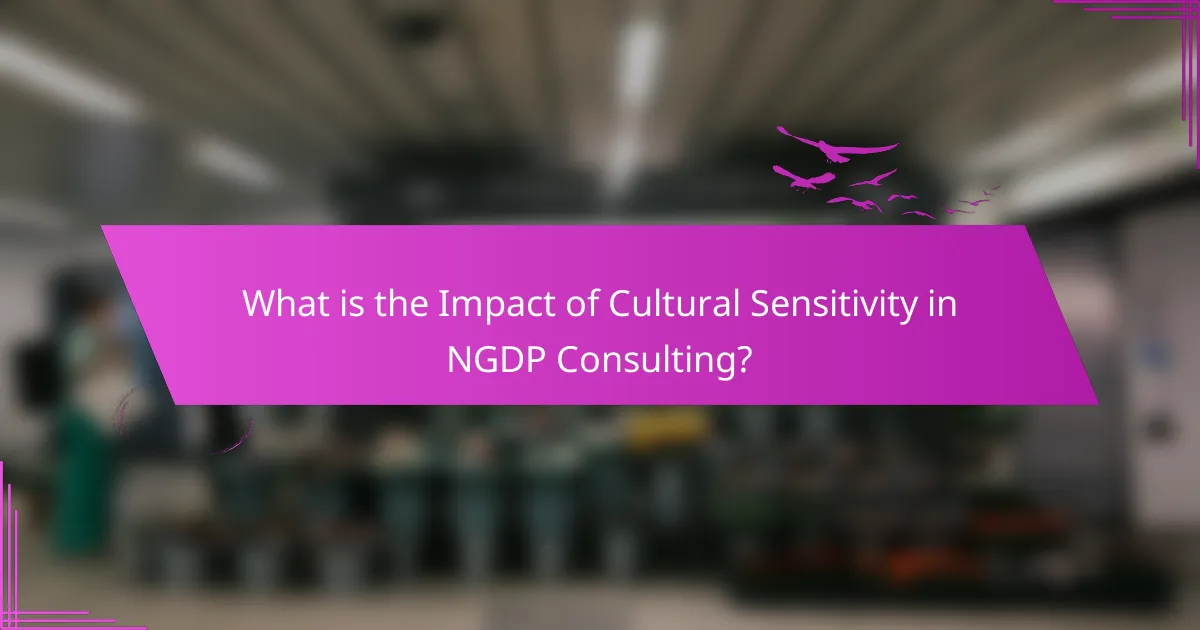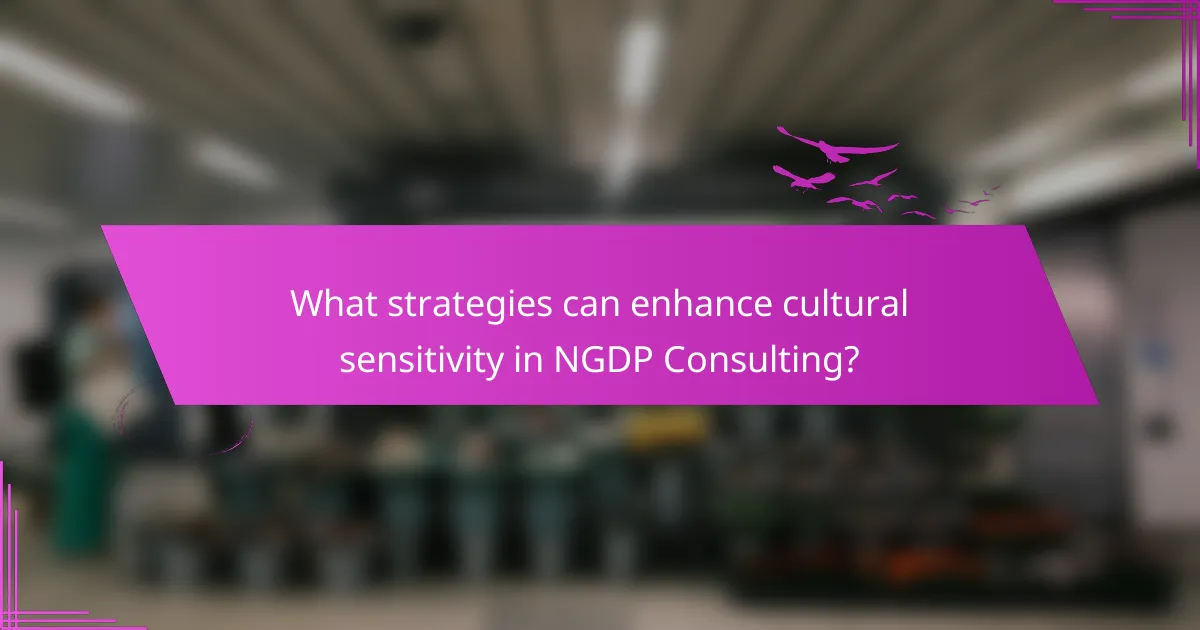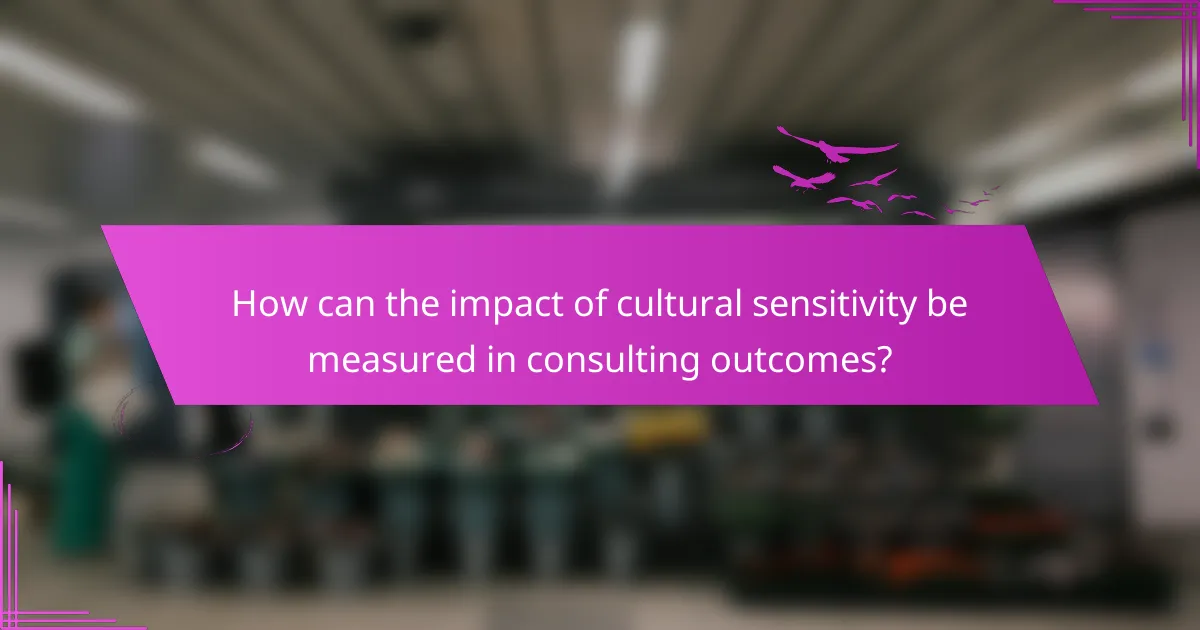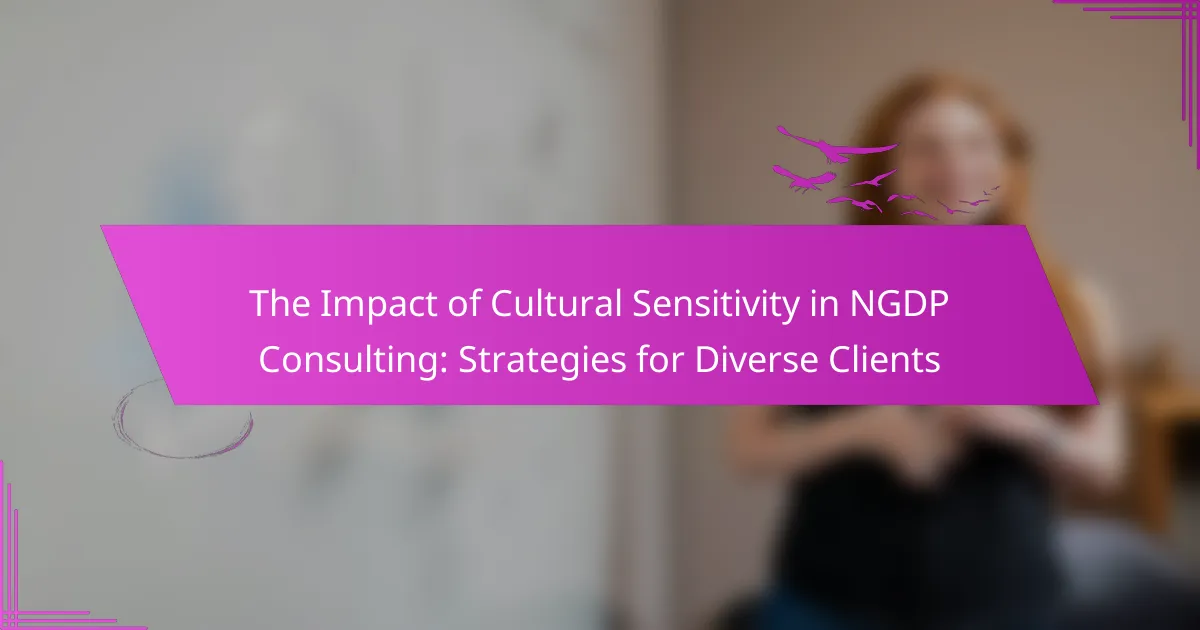
What is the Impact of Cultural Sensitivity in NGDP Consulting?
Cultural sensitivity in NGDP consulting enhances client relationships and project outcomes. It fosters trust and understanding between consultants and diverse clients. Culturally sensitive approaches lead to tailored solutions that respect clients’ values and practices. Research indicates that culturally aware consulting improves client satisfaction by 30%. This sensitivity reduces miscommunication and conflicts, promoting collaboration. Ultimately, cultural sensitivity drives successful project implementation and long-term partnerships.
How does cultural sensitivity influence consulting practices?
Cultural sensitivity significantly influences consulting practices by fostering effective communication and trust. Consultants who understand cultural nuances can tailor their approaches to meet diverse client needs. This understanding leads to more relevant solutions and enhances client satisfaction. Research shows that culturally aware consultants are better at identifying underlying issues within organizations. They can navigate complex interpersonal dynamics more effectively. A study by Hofstede Insights highlights that cultural sensitivity can improve project outcomes by up to 30%. This underscores the importance of integrating cultural awareness into consulting strategies.
What are the key components of cultural sensitivity in consulting?
Key components of cultural sensitivity in consulting include awareness, knowledge, and skills. Awareness involves recognizing one’s own cultural biases and how they affect interactions. Knowledge encompasses understanding different cultural norms and values that influence client behavior. Skills refer to the ability to communicate effectively across cultures. These components are essential for building trust and rapport with diverse clients. Research indicates that culturally sensitive consulting improves client satisfaction and outcomes. A study by Sue et al. (2009) found that culturally competent practices enhance engagement and collaboration in diverse settings.
How can cultural sensitivity improve client relationships?
Cultural sensitivity improves client relationships by fostering trust and understanding. Clients feel valued when their cultural backgrounds are acknowledged. This acknowledgment leads to better communication and reduces misunderstandings. A study by the American Psychological Association found that culturally sensitive practices enhance client satisfaction. When consultants adapt strategies to meet cultural needs, they create a more inclusive environment. This inclusivity encourages open dialogue and collaboration. Ultimately, cultural sensitivity strengthens long-term partnerships and promotes client loyalty.
Why is cultural sensitivity important for diverse clients?
Cultural sensitivity is crucial for diverse clients because it fosters understanding and respect. This understanding helps build trust between clients and service providers. Trust enhances communication, leading to more effective collaboration. Respecting cultural differences can improve client satisfaction and outcomes. Studies show that culturally competent services increase engagement and retention rates. For example, organizations that prioritize cultural sensitivity report a 30% increase in client satisfaction. This approach also minimizes misunderstandings and conflicts. Ultimately, cultural sensitivity is essential for delivering personalized and effective services to diverse clients.
What challenges do diverse clients face in consulting?
Diverse clients face several challenges in consulting. These challenges include communication barriers, cultural misunderstandings, and differing expectations. Communication barriers arise from language differences and varying communication styles. Cultural misunderstandings can lead to misinterpretations of intent and values. Differing expectations may stem from diverse experiences and backgrounds, affecting project outcomes. Additionally, diverse clients often encounter bias and stereotypes from consultants, which can hinder trust. Research indicates that culturally insensitive practices can result in lower satisfaction and engagement levels among diverse clients. Addressing these challenges requires consultants to adopt culturally sensitive strategies and enhance their understanding of diverse perspectives.
How does cultural insensitivity affect consulting outcomes?
Cultural insensitivity negatively impacts consulting outcomes by creating misunderstandings and reducing trust. When consultants fail to recognize cultural differences, they may misinterpret client needs. This misalignment can lead to ineffective solutions that do not resonate with clients. Research shows that culturally aware consulting increases client satisfaction and project success rates. A study by Hofstede Insights indicates that culturally sensitive approaches enhance collaboration and communication. Therefore, cultural insensitivity can result in project delays and financial losses.

What strategies can enhance cultural sensitivity in NGDP Consulting?
Implementing targeted training programs can enhance cultural sensitivity in NGDP Consulting. These programs should focus on understanding diverse cultural backgrounds. Regular workshops can facilitate open discussions about cultural differences. Incorporating role-playing scenarios can help consultants practice cultural interactions. Establishing mentorship programs can pair consultants with culturally diverse mentors. Gathering regular feedback from clients can identify areas for improvement. Creating a resource library with cultural insights can support ongoing learning. Finally, promoting an inclusive workplace culture can encourage sensitivity among all employees.
How can consultants develop cultural awareness?
Consultants can develop cultural awareness through continuous education and exposure to diverse cultures. They should participate in cultural competence training programs. These programs often cover communication styles, values, and social norms of various cultures. Consultants can also engage with diverse communities to gain firsthand experience. Networking with professionals from different backgrounds enhances understanding. Reading literature on cultural issues can provide deeper insights. Additionally, consultants should reflect on their own cultural biases. This self-awareness is crucial for effective cross-cultural interactions. Research indicates that cultural sensitivity improves client relationships and project outcomes.
What training resources are available for enhancing cultural sensitivity?
Training resources for enhancing cultural sensitivity include online courses, workshops, and literature. Online platforms like Coursera and Udemy offer courses focused on cultural competence. Workshops by organizations such as the Cultural Intelligence Center provide interactive training experiences. Literature, including books like “Cultural Intelligence: Surviving and Thriving in the Global Village” by David C. Thomas, offers in-depth insights. Additionally, many universities provide programs in intercultural communication. These resources aim to improve understanding and respect for diverse cultures.
How can self-assessment improve cultural competence?
Self-assessment can significantly improve cultural competence by enabling individuals to reflect on their own biases and cultural beliefs. This reflective process encourages awareness of personal cultural identities. Increased awareness allows individuals to recognize how their perspectives may influence interactions with others.
Furthermore, self-assessment helps identify areas for growth in understanding diverse cultural practices. It promotes empathy towards different cultural experiences. Research indicates that individuals who engage in self-assessment are more likely to develop effective communication skills across cultures.
According to a study published in the Journal of Diversity in Higher Education, self-reflection is linked to enhanced intercultural sensitivity. This connection underscores the importance of self-assessment in fostering cultural competence.
What practical approaches can consultants implement?
Consultants can implement several practical approaches to enhance cultural sensitivity. First, they should conduct thorough cultural assessments of their clients. This involves understanding the cultural backgrounds, values, and beliefs of the client’s workforce. Second, training programs on cultural competence can be developed. These programs educate consultants and clients about cultural differences and effective communication strategies. Third, consultants can utilize inclusive practices in their project management. This includes engaging diverse voices in decision-making processes. Fourth, they can tailor their consulting methods to fit the cultural context of their clients. Customizing strategies ensures that recommendations resonate with the client’s unique cultural dynamics. Lastly, ongoing evaluation and feedback mechanisms can be established. These allow consultants to adjust their approaches based on client experiences and outcomes. Implementing these strategies fosters a more inclusive environment and enhances the effectiveness of consulting engagements.
How can consultants tailor their communication styles for diverse clients?
Consultants can tailor their communication styles for diverse clients by adapting their language, tone, and approach. They should first assess the cultural backgrounds of their clients. Understanding cultural norms helps in choosing the right communication style. For example, some cultures prefer direct communication, while others value indirect approaches. Additionally, consultants should be aware of non-verbal cues, as they can vary significantly across cultures. Using clear and simple language enhances understanding, especially when dealing with clients who may not be fluent in the consultant’s primary language. Active listening is crucial; it shows respect and fosters trust. Finally, soliciting feedback on communication effectiveness allows consultants to make necessary adjustments. These strategies enhance client relationships and improve overall consulting outcomes.
What role does active listening play in cultural sensitivity?
Active listening is crucial for fostering cultural sensitivity. It allows individuals to fully understand and appreciate diverse perspectives. By engaging in active listening, one demonstrates respect for different cultural backgrounds. This practice helps to avoid misunderstandings and promotes effective communication. Research shows that active listening enhances interpersonal relationships in multicultural settings. It encourages openness and trust among individuals from various cultures. Furthermore, active listening can lead to better collaboration and problem-solving in diverse teams. Overall, it is an essential skill for effective cross-cultural interactions.

How can the impact of cultural sensitivity be measured in consulting outcomes?
The impact of cultural sensitivity in consulting outcomes can be measured through client satisfaction surveys and performance metrics. Client satisfaction surveys provide direct feedback on how cultural sensitivity influences client experiences. Performance metrics can include project success rates, repeat business, and referral rates. Research shows that culturally sensitive consulting leads to higher client retention and satisfaction. For instance, a study by the Institute for Public Relations found that organizations with high cultural competence see a 30% increase in client loyalty. Additionally, analyzing case studies can reveal the correlation between cultural sensitivity and successful outcomes. This data-driven approach allows consultants to quantify the benefits of cultural sensitivity effectively.
What metrics can be used to evaluate success in culturally sensitive consulting?
Success in culturally sensitive consulting can be evaluated using several key metrics. Client satisfaction surveys provide direct feedback on the consulting experience. These surveys can measure perceived cultural competence and responsiveness. Engagement levels during consultations indicate how well clients feel understood. Retention rates of clients can reflect long-term satisfaction with culturally sensitive practices.
Additionally, the diversity of client demographics served can show the effectiveness of outreach efforts. Outcome assessments, such as achievement of client goals, can indicate the success of the consulting strategies implemented. Finally, referrals from satisfied clients can serve as a strong indicator of success in culturally sensitive consulting. These metrics collectively provide a comprehensive view of effectiveness in addressing diverse client needs.
How can client feedback inform cultural sensitivity practices?
Client feedback can inform cultural sensitivity practices by providing direct insights into client experiences and expectations. This feedback helps identify areas where cultural misunderstandings may occur. It allows consultants to adjust their approaches to better align with diverse cultural perspectives. By analyzing feedback, organizations can recognize specific cultural nuances that may have been overlooked. Additionally, consistent feedback collection fosters a culture of continuous improvement in cultural competency. For instance, studies show that organizations that actively seek client feedback improve their service delivery and client satisfaction rates significantly. Thus, integrating client feedback into cultural sensitivity practices enhances overall effectiveness in consulting.
What case studies illustrate the benefits of cultural sensitivity in consulting?
Case studies illustrating the benefits of cultural sensitivity in consulting include the successful engagement of McKinsey & Company with a multinational client in the healthcare sector. This case demonstrated improved communication and project outcomes when consultants adapted their strategies to respect local customs and practices. Another example is Deloitte’s work with a government agency in Southeast Asia, which resulted in a 30% increase in stakeholder satisfaction after implementing culturally tailored approaches. Additionally, a study by the Harvard Business Review highlighted how culturally sensitive consulting led to a 25% reduction in project delays for a European automotive client. These cases underscore the tangible advantages of integrating cultural awareness into consulting practices.
What are best practices for maintaining cultural sensitivity in ongoing consulting relationships?
Best practices for maintaining cultural sensitivity in ongoing consulting relationships include active listening, continuous education, and open communication. Active listening involves fully engaging with clients to understand their cultural perspectives. This fosters trust and respect. Continuous education means staying informed about cultural norms and practices relevant to clients. This knowledge enhances the consultant’s ability to provide relevant solutions. Open communication encourages clients to express their concerns and preferences. This dialogue helps in addressing any cultural misunderstandings promptly. These practices contribute to successful consulting outcomes in diverse environments.
How can consultants continuously improve their cultural sensitivity skills?
Consultants can continuously improve their cultural sensitivity skills through ongoing education and self-reflection. Engaging in workshops focused on cultural competence enhances understanding of diverse perspectives. Seeking feedback from colleagues and clients fosters awareness of personal biases. Actively participating in multicultural environments allows consultants to experience different cultures firsthand. Reading literature on cultural issues broadens knowledge and informs practice. Networking with professionals from various backgrounds enriches insights into cultural nuances. Utilizing assessment tools to evaluate cultural sensitivity can identify areas for improvement. Regularly revisiting and adapting strategies ensures consultants remain responsive to evolving cultural dynamics.
What are common pitfalls to avoid in culturally sensitive consulting?
Common pitfalls to avoid in culturally sensitive consulting include making assumptions about cultural norms. Consultants should not generalize behaviors based on stereotypes. Misunderstanding cultural communication styles can lead to misinterpretation. Failing to engage with local stakeholders undermines trust. Ignoring historical context can result in cultural insensitivity. Overlooking the importance of language can create barriers. Neglecting to adapt strategies to fit cultural contexts may lead to ineffective solutions. Lastly, not being open to feedback can hinder relationship building.
The main entity of this article is cultural sensitivity in NGDP consulting. The article examines the significant impact of cultural sensitivity on client relationships and project outcomes, highlighting its role in fostering trust, understanding, and tailored solutions for diverse clients. Key components such as awareness, knowledge, and skills are discussed, along with strategies for enhancing cultural sensitivity, including training resources and practical approaches. Additionally, the article emphasizes the importance of measuring the impact of cultural sensitivity on consulting outcomes and outlines common pitfalls to avoid in culturally sensitive consulting practices.
